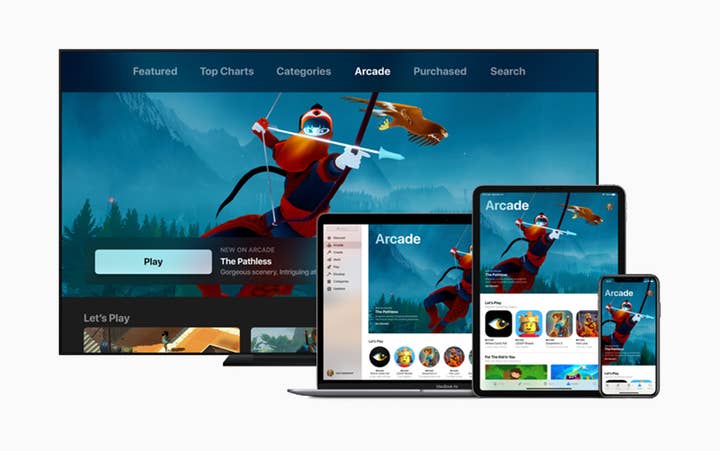Apple Arcade is a short-term fix with far reaching consequences | Opinion
Is Apple Arcade the ultimate solution to selling premium mobile games, or a walled oasis offering a reprieve from a larger problem?
In an interview with Gamesindustry.biz, Ustwo studio head Dan Gray said that Apple Arcade relieves the burden of having to explain to players that mobile games are really worth the £3.99 price tag. Gray said that making premium games has been a dangerous proposition for a number of years, and that even for a successful studio like Ustwo, it would still be dangerous to throw a game out there and charge £5. According to Gray, one of the positive things about subscription in general is there's no direct one-for-one value transaction.
I agree with Gray on all of these points. With Apple Arcade it's now up to Apple to convince players to pay for games. However, this merely solves a short-term problem that developers face, but in the long-run Apple Arcade and similar subscription services could be harmful to the games industry as a whole.
Like Gray, most developers that are part of the Apple Arcade launch line-up are very happy with their deals. Apple has probably paid them a substantial chunk of money for exclusivity, plus it's Apple's problem to sell the content to users. This eliminates the financial risk for developers, they get money upfront and can focus on production, and the marketing will largely be handled by someone else.
"This reminds me of the old days of boxed games, where publishers were the gatekeepers to store shelves"
This reminds me of the old days of boxed games, where publishers were the gatekeepers to store shelves. Developers had to go through them to get games in front of consumers. When platforms like Google Play, Steam and the Apple App Store launched, developers were no longer dependent on others to release their games. They had the freedom to publish on their own terms, with complete creative freedom, and without having to share as much of their revenue.
A decade later, that joy has turned into despair for many. With huge amounts of games swarming every single platform, developers are struggling for consumer attention. Once again they have become dependant on others for their livelihoods, only this time it's the platform holders. The latter have the power to lift games from obscurity through featuring, but other than that they haven't been very helpful in resolving the discoverability problem. On the contrary, platforms have made it easier and easier to release content; Valve has opened its floodgates to the point where anybody with $100 in their pocket can release a game.
It seems that platform holders have figured out that consumers only spend X amount of money on their platforms, and as long as they get their 30% they see little need to invest money and resources in safeguarding quality or trying to limit the number of games. The only solution that platform holders have offered struggling developers is to lower the price of games in exchange for attention.
Most developers take part in these sale events because it gets their games in front of consumers and generates sales, which means getting the necessary money in the bank to survive. Not a bad deal it seems, but what it actually teaches consumers is that games are overpriced and not worth buying if you don't get a huge discount.

And that's why pretty much every developer is struggling to convince players to pay for their games. Apple Arcade, the nice and welcoming walled oasis that Apple has created on its platform, is offering a solution to this problem. I can't blame Gray for being happy with that solution -- most developers seem to be -- but we might have to ask ourselves what that oasis does to premium mobile games outside the Apple Arcade walls, or even for premium games in general. Because with Apple Arcade, we're basically telling consumers that instead of paying £3.99 for one game, you can get 100 high quality games for only £4.99.
"It's not unthinkable that a subscription service will make it nearly impossible to sell premium mobile games as a single product"
The chances are that it becomes even more difficult to convince consumers to pay any reasonable amount of money for a single game; assuming that there will still be a sustainable market for premium mobile games outside of Apple Arcade, because it's not unthinkable that a subscription service will make it nearly impossible to sell premium games as a single product. Why would anyone be willing to pay anywhere near £4.99 for a single game when they can get a whole library of games for the same amount? In that context, convincing consumers to shell out any amount over, let's say, £0.99 would require a very special game. We've all seen what streaming services have done to the music industry and the sales of CDs.
And what happens if Apple Arcade becomes the mainstream for premium games? If Apple is in charge of the only viable platform for premium games on iOS, and you can only enter the walled oasis if you're handpicked, it gives Apple great power. This will come with consequences, not least the amount of money that Apple is willing to invest in getting developers to release games on Apple Arcade. Sure, it will keep paying for the top titles -- the subscription sellers -- but for others the purse strings will most likely be tightened, or perhaps the coffers will completely close. Call me pessimistic, but if history has taught us anything, it's that when publishers and platform holders grow in power, it has a negative impact on the love they show to the game development community at large.
Don't get me wrong, I do realise that Apple is a business and that its ultimate goal is to make money and keep its shareholders happy, but I strongly believe that these kinds of companies also have a larger responsibility. Apple should make creating a healthy environment for everyone involved a top priority; not out of altruism, but simply because it's good for business to create a platform that's sustainable for the people who create the content, so that they can keep making that content. Apple can do that and still make money.
With Apple Arcade, it has shown it has the funding and the ability to curate games; something it could have done with the App Store in general, without building a separate walled garden. Everyone would have benefited; the App Store would have the high quality content that Apple takes pride in, consumers wouldn't need subscription to find games they can love, and developers would have a better chance to get their games noticed and make a decent living.
The only challenge that would remain would be to convince consumers that games are worth paying money for in the first place. But that can be done. A company like Apple -- which has convinced huge numbers of people to pay almost double for its hardware for years -- should be able to explain to players that games are worth something. And worth more than an all-you-can-eat service at £4.99 a month.
Alessandra van Otterlo is the owner and editor-in-chief of Control Magazine, and co-organizer of the European Game Showcase at GDC.
